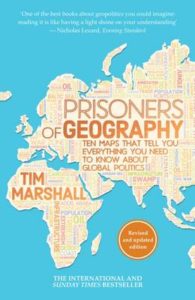Will we still be prisoners of geography? The conundrum Tim Marshall leaves unaddressed
I’m an outlier when it comes to Prisoners of Geography: Ten Maps That Tell You Everything You Need to Know About Global Politics by Tim Marshall.
This popular book by foreign affairs correspondent Tim Marshall has achieved the impressive combination of not only receiving many glowing reviews by experts but also sustained high sales with the public. That’s thanks to the way he expertly and thoughtfully dissects the geographic stories behind much of the globe’s political and economic history.
So why am I an outlier? Partly because the maps reproduced in it are not very good. The text is far better than the maps. Those maps would be fine with another title, but when the title promises you something special involving maps, something better than competent and unimaginative maps is reasonable to expect. If you’ve got a cheap printed atlas nearby, odds are it has maps as good if not better than those in this book.
Mostly, however, my reason for dissatisfaction on finishing the book is that Tim Marshall never gives really serious thought to whether geography is still as important in shaping politics, foreign affairs and wars as it used to be.
He talks about Bangladesh being cursed by its easily flooded geography as if that has set an inevitable fate for the country. Yet we don’t hear about Holland and its victory for engineering over water.
Similarly, he talks about Russia’s historic search for a warm water port but gives little consideration to how much that still matters in a world where so much economic activity has moved away from the transport of physical goods.
Nor does the Rhine get much of a mention: a river that used to be central to politics in western Europe as different countries pushed to have their boundaries on, or beyond, the river. Now, however, the location of the Rhine is a minor detail in stories of French and German relations. The big questions of French and German diplomacy over the last few decades – reunification of Germany, greater unification within the European Union – are detached from the Rhine’s course or even existence.
Perhaps Holland and the Rhine are an example of a small number of exceptions where geography has declined greatly in importance. Or perhaps they are part of a wider trend, one which warns us against consigning different countries to different courses just because of geography’s current influence on them.
We may have been prisoners of geography in the past, as Tim Marshall’s book explains so well, but it assumes too much that geography will continue to be as effective a jailer in the future.
If you like this, you might also be interested in Superforecasting: The art and science of prediction.

Bit of both, I suspect. Huge amounts of material are still being shipped. Last time I looked, volumes were still increasing. Of course the importance of geography can decline: when Scots and English stopped fighting one another, the Tweed and the Cheviots became less important. England cares less about the Low Countries now because we no longer sell huge amounts of wool to them. Other aspects of physical geography will continue to be important. The history of the Russian and Western interventions in Afghanistan would have been different if the south of the country were a fertile plain. Having the northern part of your African country in the Sahel is a problem because the people will be very different from those further south and climate change is likely to hit these areas very hard, encouraging desperation and extremism.
At the same time, we’re making many links online that have little to do with physical geography, though some to do with wealth (Africa’s low use of the internet) or language (why online English-language groups may have plenty of people from the Indian subcontinent and fewer from East Asia). This also means that the traditional Liberal focus on local communities remains relevant , but needs to take in non-geographical communities.